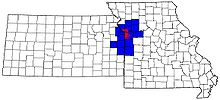Contents

Kansas and Missouri are two bordering U.S. states with a long and tumultuous history. The relationship between these two states has its roots in Bleeding Kansas, but mutual distrust has continued off and on since then, even in sporting contexts.[1] These states also share the Kansas City metropolitan area, where both states each have a city named "Kansas City" on either side of the Missouri River.
Kansas City twice
Sometimes there is disagreement on which of the two cities are considered to be the "real Kansas City"; they are commonly abbreviated as "KCK" and "KCMO" for Kansas City, Kansas and Kansas City, Missouri respectively.
As recently as 2019, the governors of the two states signed an agreement to stop offering financial incentives to pull a business from the other Kansas City.[2] This pact was referenced in 2022 when the governor of Kansas spoke in favor of the Chiefs football team moving their arena to Kansas, from the Missouri side.[3] As of 2024, the Chiefs remain in Kansas City, Missouri.
History
Missouri was formed out of the Missouri Territory as a slave state during the early 19th century in 1821. Northern states wanting to slow the westward spread of slavery hammered out the Missouri Compromise with southern states anxious to keep slavery legal; this compromise ensured that any state directly west of Missouri would be a free state where slavery would be illegal.
In 1854, Congress passed the Kansas–Nebraska Act that allowed the territory's residents to vote on whether slavery would be allowed.[4] This act repealed the Missouri Compromise and spurred interest in the territory. Both pro-slavery and anti-slavery boosters flooded into Kansas, but due to the state's proximity to Missouri, most were pro-slavery men from Missouri. They successfully stacked the vote to form a temporary pro-slavery government prior to statehood. Tensions resulting from this would lead to Bleeding Kansas and the Kansas-Missouri border wars, a violent and bloody civil war that would foreshadow the much larger American Civil War.[4]
Though Missouri was in the Union during the Civil War, “most of its population was pro-slavery.”[4] Forty years after Missouri statehood, in 1861, Kansas was admitted as a state of the Union, a free state, as the abolitionists had won in Kansas, as the larger Civil War had begun.
The violence and war deeply harmed the relationship between the two areas, even after Kansas attained statehood and the war had ended. Violence and guerrilla warfare continued for several years thereafter until the American Civil War ended in 1865, with many unjust killings and lootings performed by partisans on either side of the border.[5]
The two states, being neighbors, have to deal with each other regularly, but the bitterness sown during Bleeding Kansas lingers. To some extent, this is reflected in university athletics, as the Border War rivalry between the two states' main universities shows.[6] The two states also compete economically.[7]
References
- ^ "Things You May Not Know About the US States". Archived from the original on 2014-03-06. Retrieved 2014-03-06.
- ^ Hardy, Kevin (August 14, 2019). "'Sometimes common sense does prevail.' Missouri, Kansas celebrate end of border war". The Kansas City Star. Retrieved March 5, 2024.
- ^ Bergan, Shain (March 31, 2022). "Governor 'all for it' on moving Chiefs to Kansas, says team was not part of Border War truce". KCTV5. Retrieved March 5, 2024.
The Kansas governor on Thursday morning stoked conversation on the possibility of a Chiefs move to the other side of the state line, noting that the NFL franchise was not part of the 2019 Border War truce between the two states.
- ^ a b c Alexander, Kathy (January 2023). "Bleeding Kansas and the Missouri Border War". Legends of America. Retrieved March 5, 2024.
The Kansas-Nebraska Act also repealed the Missouri Compromise and reopened the issue of extending slavery north, allowing the two territories to decide the matter. As a result, settlement of the state was spurred, not so much by westward expansion as by the determination of both pro-slavery and abolitionist factions to achieve a majority population in the territory.
- ^ Neely, Jeremy. ""A Most Cruel and Unjust War:" The Guerrilla Struggle along the Missouri-Kansas Border | Civil War on the Western Border: The Missouri-Kansas Conflict, 1854–1865". Civil War on the Western Border. Retrieved October 24, 2023.
- ^ Brennan, Eamonn (2007-11-23). "Some rivalries can survive realignment – Men's College Basketball Nation Blog – ESPN". Espn.go.com. Retrieved 2013-10-12.
- ^ Jordan, Dave (2010-05-01). "Group wants to stop Missouri-Kansas border war". KCTV5. Archived from the original on 2013-10-16. Retrieved 2013-10-12.

